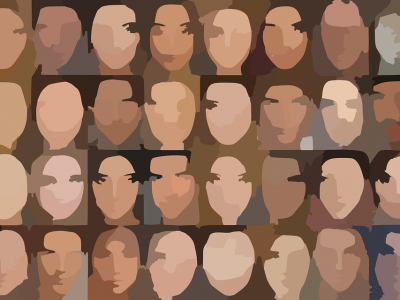Meet Khaled Alaa Abdel Fattah, born last Tuesday to two Egyptian cyber-activists: mother Manal Bahey al-Din Hassan and father Alaa Abd El-Fattah, who is currently in prison. Khaled is named after Khaled Said, the young man whose violent death at the hands of police in 2010 became a symbol and rallying point for activism that brought down the Mubarak regime earlier this year.”
Little Khaled was born as Internet-driven activism in another part of the world, Russia, is bringing a new generation of young people – many of whom had never participated in a protest before – into the streets to oppose election results that they believe to have been rigged in the ruling party's favor. One blogger told TIME magazine that he risked reprisals by United Russia supporters to post flyers around Moscow on the eve of the election, calling on people to vote against them. One flyer said:
“One day, your child will ask you, Papa, what were you doing when the crooks and thieves were robbing our country blind?”
People like Alaa, Syrian blogger Razan Ghazzawi who was arrested on the Jordanian border this weekend, and Ali Abdulemam, the Bahraini blogger who has been in hiding since February, are all fighting for a world in which their own children will be able to speak their minds and participate in opposition politics without going to prison. But what about the rest of us? To echo the Russian blogger's question:
What are we doing to make sure that our children will even be able to use the Internet to fight for their rights speak truth to power?
The battle for freedom and control of the Internet continues to rage, as events of the past fortnight certainly demonstrate:
Surveillance: The biggest surveillance-related news of the past fortnight is that WikiLeaks launched the SpyFiles: a trove of documents from companies that sell surveillance technology all over the world. In reaction to the steady stream of news about Western companies selling surveillance technology, the EU Council banned exports to Syria (PDF) of equipment and software used to monitor internet and telephone communications. In Washington DC, a new version of the Global Online Freedom Act, which seeks to ban the sale of surveillance technology by U.S. firms to repressive regimes, was introduced in the House of Representatives.
Last month we reported on controversy surrounding the CarrierIQ software which logs user activity on some smartphones. AT&T and Sprint confirmed that they use CarrierIQ. Naturally, someone has developed a software program so that you can check to see if your Android phone is running Carrier IQ.
The Indonesian government has now jumped on the bandwagon of governments demanding that RIM, the maker of BlackBerry, must locate its BlackBerry Messenger servers inside Indonesia (to facilitate domestic surveillance) or face shutdown of all BBM and Internet services in that country.
Copywars: A world-wide war is being waged between those who want intellectual property protections to be beefed up at all costs on the one hand; versus a rather amazing alliance of the free speech, human rights and Internet activism communities worldwide, plus the global Internet engineering community, plus the Internet industry. The front lines of this war are currently in the United States, around two proposed bills before the U.S. Congress: the Stop Online Piracy Act (SOPA) and the Protect IP Act (PIPA) which would create (as yours truly has argued elsewhere) a “Great Firewall of America” and compel website operators to monitor and censor their users. Opponents point to the recent case of Dajaz1.com as one example of why SOPA and PIPA are dangerous. Meanwhile, in an example of how the new legislation would simply escalate the arms race of censorship and circumvention, a group of programmers released a new browser add-on to tackle with internet censorship. Last week, bipartisan lawmakers proposed an alternative to SOPA and PIPA, called OPEN. Techdirt has a detailed analysis: in short, it's better than SOPA/PIPA but is not without its own problems as far as online free speech is concerned.
On other fronts: The European Union Court of Justice decided that ISP's cannot be asked to implement systems of internet traffic filtering aiming at unauthorized music files sharing.
Australian ISPs proposed the “Scheme to Address Online Copyright Infringement.” (pdf) The proposal adopts three stages – education, warning, and discovery, to deal with the consumers who may have engage in the unauthorized file sharing. See this analysis by Ars Technica.
Google began adding websites that may involve unauthorized file sharing to its search blacklist.
Meanwhile an expert at a public consultation hosted by Office of the UN High Commissioner of Human Rights called for more policy emphasis on the right of people to enjoy the benefits of scientific progress.
Censorship: There never seems to be any respite in global censorship news. A proposal at the Organization for Security and Cooperation in Europe supported by more than half of the organization's 56 members was blocked by a number of countries including Russia – where popular websites and media involved with monitoring the recent parliamentary election or which supported opposition parties were attacked.
Hungary enacted a new law to monitor media, including the Internet. The Thai government censored Facebook remarks about the King. The Turkish government introduced a new Internet filtering system. The Indian government demanded that Internet companies such as Google, Facebook to censor “disparaging, inflammatory or defamatory” content.
Chinese government-affiliated media continued to publish articles calling for a crackdown on “Internet rumors,” foreshadowing a new crackdown on much more than just “rumors.”
More thuggery (in addition to that described at the beginning of this post): Vietnamese blogger Pham Minh Hoang had his sentence reduced in the wake of international outcry but it is still three years long.
A student in Azerbaijan was jailed because of a Facebook message. A Bahraini Twitter user was jailed for 66 days, while other Bahraini activists received threatening messages on Twitter. In Zimbabwe, Media Monitoring Project staff were detained. A U.S. blogger went to jail in Thailand for insulting the King.
National policy: The UK plans to strengthen its cyber security to counter possible threats, but the strategies may involve censorship. Harvard University professor and cyber law expert Susan Crawford argues that the U.S. government should adopt a “patch-like” approach to cyber security issue instead of trying to create an “omnibus bill” which would have undesirable side affects for citizens.
Netizen Power: In Saudi Arabia, netizens turn to online activism to draw attention to protests in Qatif. In the United States, members of the Occupy Movement have created an Occupy Research wiki page “for sharing datasets, as well as for sharing information about how Occupy Researchers might collaborate to gather, share, analyze, and visualize data about the movement.”
Sovereigns of Cyberspace: Facebook reached a settlement with the U.S. government's Federal Trade Commission on privacy protection. Members of the Occupy Movement are petitioning Facebook to change policies which they believe hurt activists.
Activists in the United States are petitioning Google to quit the U.S. Chamber of Commerce which they argue pursues “evil” companies that bolster the interests of corporations at the expense of ordinary citizens.
Verizon asked Google not to include Google Wallet, a payment program which may be rival to Verizon’s own payment system, on Galaxy Nexus phone. However this request may violate FCC rules.
Twitter acquired a start-up company that has focuses on privacy-protection technology.
Internet Governance: Despite opposition by a number of industry groups and questions from the Senate the U.S. government affirmed both the ICANN Internet governance model and the new generic Top-Level Domains (gTLDs) to be launched early next year.
Publications and Resources:
- Global Information Society Watch: 2011 – Internet Rights and Democratization.
- Electronic Frontier Foundation: Global Censorship Chokepoints, Free Speech is Only as Strong as the Weakest Link
and also: How WikiLeaks Has Influenced Foreign Policy, Journalism, and the First Amendment - John Palfrey and Jonathan Zittrain: Better Data for a Better Internet. The authors argue that we need better data about what’s going on online in order to make better decision on Internet policy.
- Citizen lab: Behind Blue Coat (update).
- Centre for Internet and Society, Bangalore: Digital Natives and Politics in Asia.
- Family Safety Online Institute: The State of Online Safety 2011 (pdf)
- Battling the Internet Water Army: Detection of Hidden Paid Posters [in China].
EVENTS: For upcoming events related to the future of citizen rights in the digital age see the Global Voices events calendar.
MORE: If this fortnightly report is not enough to feed your appetite, follow the #netfreedom Twitter hashtag and our netizenreport bookmark on Diigo.
NOTE: This report would not have been possible without the considerable help of Weiping Li.





4 comments
For those interested in the Carrier IQ issue, here are some websites of folks who actually didn’t take the video at face value.
It is technical but pretty much throws the findings out the window.
For those who are interested in some technical details, i would like to suggest the following:
http://www.dailytech.com/Article.aspx?newsid=23483&red=y#736483
Also
http://vulnfactory.org/blog/2011/12/05/carrieriq-the-real-story/
i think it will elevate a lot of the stress and panic people are feeling.